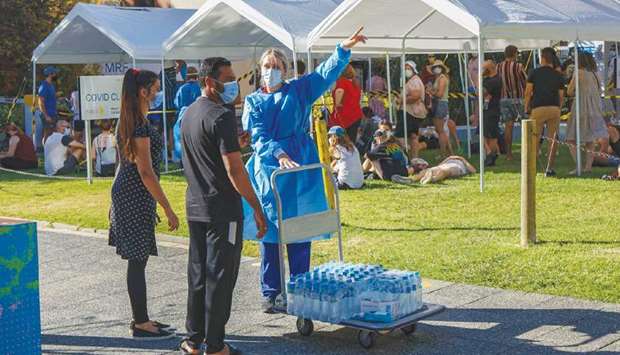The Australian city of Perth began a snap five-day lockdown after a security guard at a quarantine hotel tested positive for Covid-19, authorities announced yesterday.
Roughly 2mn residents of the city were ordered to stay at home from yesterday evening, as were those living in the nearby Peel and South West regions.
A scheduled return of schools today was delayed, with locals only permitted to leave their homes for exercise, medical care, essential work or to buy food.
The new rules follow the first case of community transmission in Western Australia state for 10 months, officials said.
“Our model is to deal with it very, very quickly and harshly... so that we can bring it under control and not have community spread of the virus as you have seen in other countries around the world,” state Premier Mark McGowan said.
Authorities believe the man contracted the virus from a returning traveller quarantining in a hotel in Australia’s fourth-biggest city.
The traveller is thought to have picked up a UK variant of the virus believed to be more infectious than Covid-19 strains previously detected in Australia.
Genomic testing is underway to determine the precise source of the man’s infection, and health officials said he may have visited more than a dozen locations while carrying the virus.
Cafes and restaurants have been ordered to close, while visits to health facilities are banned and weddings cancelled.
“What we’re trying to do is have a (short) period of disruption rather than a long period of disruption, and therefore some adverse health outcomes,” McGowan said.
“We are trying to crush the virus as quickly as we possibly can.” The restrictions are the toughest seen in Perth since the early stages of the pandemic, while masks have been made mandatory for the first time.
Western Australia kept its borders closed for most of 2020, cutting itself off from the rest of the nation but allowing the state to enjoy many months of relative normality.
The snap lockdown comes three weeks after similar measures were implemented in the eastern city of Brisbane, prompted by a hotel cleaner contracting the variant.
Those restrictions were quickly lifted when it became clear the virus had not taken hold in the community.
Australia has fared relatively well during the pandemic, recording just over 28,800 Covid-19 cases and 909 deaths linked to the virus in a population of about 25mn. Australia will invite pharmacies this week to join a government-funded rollout of Covid-19 vaccine, the federal government said yesterday.
The government will ask the country’s roughly 5,800 community pharmacies to apply for the programme, which would pay them to administer inoculations, along with doctors and hospital health workers.
“That means more points of presence for Australians in terms of where they can receive their Covid-19 vaccine,” Health Minister Greg Hunt told reporters.
“This is potentially life-saving medication. The medicines can work with differing degrees of effectiveness, but all up, this can improve lives, extend lives, or save lives.”
The government plans to start vaccinating priority groups like older and Indigenous Australians with a shot developed by Pfizer and BioNTech from late February.
The plan also involves a vaccine developed by AstraZeneca, although that product has not yet been approved by Australia’s Therapeutic Goods Administration.
Pharmacists involved in the programme would receive training to administer the AstraZeneca vaccine, with first shots planned in May, Hunt said.
Meanwhile Australia reopened its “travel bubble” with New Zealand yesterday after the neighbouring country reported no new locally acquired Covid-19 cases, but added new screening measures. The decision marks the resumption of the only international arrivals into Australia who do not require 14 days in hotel quarantine.
Australia had paused quarantine exemptions for trans-Tasman arrivals six days earlier after New Zealand reported its first new case in months.Arrivals from New Zealand “are now judged to be sufficiently low risk, given New Zealand’s strong public health response to Covid-19”, acting Australian Chief Medical Officer Michael Kidd told reporters.
However, Australia would require screening of travellers from New Zealand before and after flights for the next 10 days, Kidd added, “given there is still a small risk of further associated cases being detected and with an abundance of caution”.

A health worker directs people wanting to be tested for Covid-19 to the end of the queue at Royal Perth Hospital in Perth yesterday, as authorities announced a snap five-day lockdown after a security guard at a quarantine hotel tested positive for Covid-19 ending western Australia’s 10 month coronavirus-free streak.
